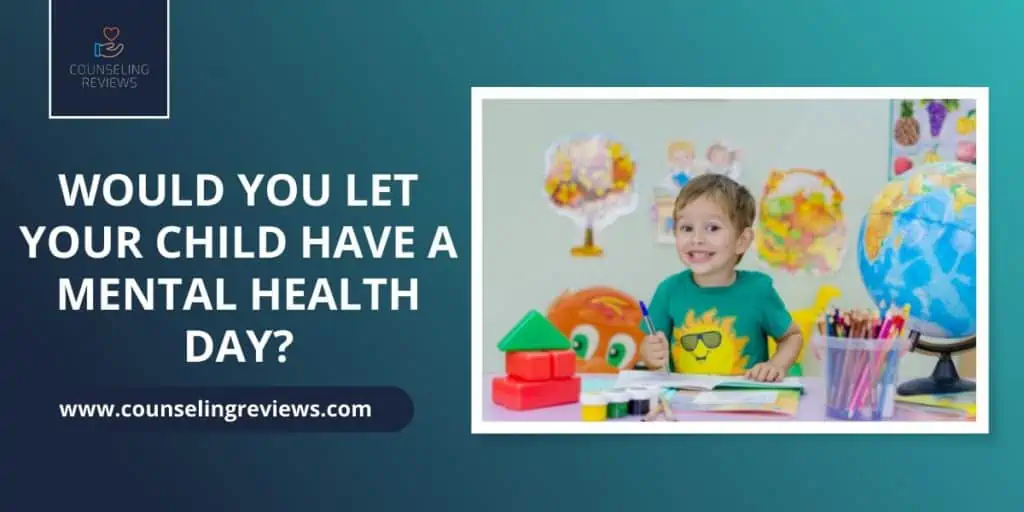Kids aren’t immune to the different stresses of life. It could be financial stress, family stress, or academic stress, like feeling pressured to perform on a major exam. Family problems can also lead to anxiety for both parents and kids. Having a mental day can help your kids cope if they are under a lot of stress.
Study shows that one in six children between the ages of 6 and 17 experience a mental health disorder each year. In response to these rising rates of feelings of depression, Utah in 2018 passed a bill that states students are allowed to take school day as a mental health day as an excused absence from school.
Other states also followed Utah’s decision in 2019 when it enacted a similar way.
In this post, we’ll discuss what mental health day is? Why does your child need a mental health day? And what to do on a kid’s mental health day?
So, let’s dive in.

What is a mental health day?
Adults take mental health days off from their work to relieve stress or regain their energy. Kids can do the same – only it is a break from school. Taking a day off missing school, where they do not have to think about tests, homework, or being a high performer gives them a chance to enjoy being a kid again.
Luckily, many schools over half the country are now allowing kids to stay home for a mental health day, as they would for any sick day—these new rules come amidst rising anxiety, depression, and suicide rates among kids.
Why your kids may need a mental health day?
Whether the school of your kids recognizes mental health day or not, these mental and behavioral health reasons just may be the reasons they need one.
Relationship struggles
Because many teenagers and adolescents are working on relationships with both romantic prospects and peers, and when something goes wrong with those relationships, kids can take it very hard.
They may feel like the world is ending, and they can’t handle things because those relationship issues are overwhelming their thoughts. This can further lead to stress and anxiety. They’re overly focused on what is going on in their relationship and might not study or respond positively to other people.
Performance pressure
Achieving excellent grades is one of the major reasons for creating stress in kids. The pressure of doing well academically, or for older kids getting into a particular college or university, is stressful. One of the questions that come up for students is, Am I smart enough? Am I good enough? This means there is a lot of self-doubt at this age, which is hard for kids.
High school students feel more stress and extra pressure when it comes to higher education. Because in most countries, it’s so expensive, and then there is another pressure from their families figuring out tuition dollars.
Parents expect their children to excel so they can get a scholarship and financial support to be at the school. And kids feel that pressure.
It also applies to sports or other extracurricular activities. For a lot of adolescents, sports are a tremendous pressure. Because they think it’s their way to shine, and if something goes wrong and they’re not playing well, they can be hard on themselves.
Family trauma
When parents lose a job, become ill, or even get divorced, then kids experience anxiety, and it’s common.
All these conditions bring uncertainty, the uncertainty of what is going to happen in future. It may be that children need to help their family in different ways, they miss school, and they cannot be in activities because they have to watch a younger sibling after school.
Parents can help their younger children out by having open communication, which can ease their anxiety. Children absorb what’s going on; you don’t have to give the complete details.
Existing mental illness
If your child is already suffering from a mental health disorder, they may not have the resiliency to handle life events. And because of this, they may be more likely to have a mental health day or more frequent mental health days.
For children with known mental or physical health conditions, mental health days are a great start. But you also need to make sure they are getting the necessary treatment if they’re experiencing stress. They can also talk to a therapist who can improve their coping skills.
When is the time to have a mental health day?
Some stress is normal, but it can become problematic when there is a collaboration of events in a child’s wife.
Mental health professionals look at how many things happened in a row. If there’s a divorce, that creates a little amount of stress but does not always get to a toxic level. But suppose a child experiences divorce and is failing with grades, experiencing relationship issues. In that case, all these things happening together in a short period can create severe stress levels.
Following are the signs that your child’s mental health day may be overwhelmed by the events in their life:
-
Begins isolating themselves – while adolescents and teens may stay in their rooms for some time, they tend to come out and interact with other family members.
-
Physical changes – mental health issues can first present as stomach aches, headaches, and sleepiness.
-
Easily irritated – if your child suddenly becomes short-tempered or displays anger issues.
What to do on a mental health day?
Anything is fair game for mental health day. Spend an unconstructed day with the kids and ask them what they want to do. The only idea is to get out of the normal daily routine and not involve them in any regular work that causes stress. The mental health day activities should be fun and fulfilling.
If your kids like to play basketball, take them to an NBA game. They can plan a few activities with their close friends.
But the most important is to ask the question: what gives you the most enjoyment? What would you like to do today? If you could do anything, what would it be?
In Conclusion
If your child shows signs that they are ready for a mental health day, mental health expert says the kids mental health day should be a time for them to recharge, relax, talk about their issues with a parent, and get help from a professional, if required. Learn more about mental health from our list of tips
If you have guilt about not offer mental health days or letting your kids take a mental health day, then they might feel guilty too. Look at it as learning to take care of oneself. And learning to be purposeful and mindful about self-care.
FAQs
Kids can take care of their mental and emotional health by engaging in activities they enjoy, spending time with loved ones, practicing self-care, and seeking support when needed. They can participate in hobbies, play sports, read books, or engage in creative outlets. Developing healthy coping mechanisms, such as deep breathing or journaling, can also help. Additionally, maintaining open communication with trusted adults and seeking professional help when necessary are important steps in caring for their mental well-being.
Yes, as a parent, it is important to consider allowing your child to take a mental health day if they show signs of being overwhelmed or stressed. Mental health is crucial for overall well-being, and children also experience various pressures and challenges. Taking a break from school and responsibilities can provide them with an opportunity to recharge, relax, and address their mental well-being. It is essential to have open communication with your child, understand their needs, and support them in taking care of their mental health.
National Child Mental Health Awareness Days aims to raise awareness about children’s mental health issues. It serves as a reminder to society to prioritize and address the issues and challenges faced by children and recognize mental health days. The day aims to promote child protection, education, healthcare, and overall development. It provides an opportunity to advocate for children’s rights, amplify their voices, and work towards creating a safe, nurturing, and inclusive environment for all children. Children’s Awareness Day is celebrated worldwide on various dates, depending on the country or organization promoting it.




